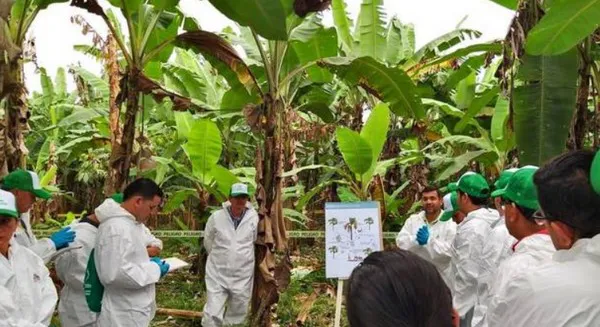The Food and Agriculture Organization of the United Nations (FAO) has launched an emergency project under its Technical Cooperation Program to help countries in Latin America and the Caribbean fight the spread of Fusarium wilt.

TR4 was recently detected for the first time in Latin America and the Caribbean in Colombia, where 175 hectares of banana farms have now been put under quarantine by the Instituto Colombiano Agropecuario (ICA). Nearby Ecuador is the world's largest banana exporter, while Colombia, Costa Rica, and Guatemala are also major producers. If the disease spreads, it would have devastating impacts for farmers and their families across the region.
"The role of bananas in providing food and household income in this region cannot be understated. In several countries, this crop has national economic importance, as it is a major export. Together, we can curb the spread of this devastating disease, and protect livelihoods," said FAO Assistant Director-General and Regional Representative for Latin America and the Caribbean, Julio Berdegué.
"This emergency project will assist countries in developing regional and national action plans, increasing their capacities to prevent, diagnose, monitor and contain outbreaks, and raise awareness and disseminate information among farming communities," he added.
In addition, the new TR4 wilt project for Latin America and Caribbean also aims to support greater collaboration and experience-sharing among the countries in the region.
These activities will be conducted, under the leadership of national governments, in a coordinated effort with relevant phytosanitary institutions, including national and regional plant protection organizations (CAHFSA, CAN, COSAVE, OIRSA) as well as the International Plant Protection Convention (IPPC) Secretariat.
"Countries must be vigilant in monitoring and containing any TR4 cases. Only strict observation of phytosanitary measures can prevent the disease from spreading. Concerted local and regional efforts, scientific support, early detection and international collaboration are crucial to combat TR4," said Hans Dreyer, Director of FAO's Plant Production and Protection Division.
FAO's response
At the international level, FAO is establishing a global network on TR4 under the World Banana Forum, the multi-stakeholder platform of the banana sector, which the Organization facilitates. The network will help coordinate actions and disseminate technical advice from specialized bodies, including the Forum's TR4 Task Force.
Additionally, the International Plant Protection Convention (IPPC), whose Secretariat is hosted by FAO, also recently convened a workshop in Colombia for agricultural experts from 16 Latin American countries on plant health including best practices to prevent the spread of Fusarium wilt.
The Cavendish banana variety makes up around 47 percent of global production. Diversification, soil health and better use of available genetic resources are key to building resilience to the disease in the long term. Threats to the Cavendish may encourage farmers, and the private sector, to move away from monocropping towards more biodiverse plantation systems using some of the 1,000-plus other banana varieties.
For more information:
Cecilia Valdes
FAO
Tel: +56 229 232 100
Email: Cecilia.Valdes@fao.org
www.fao.org
